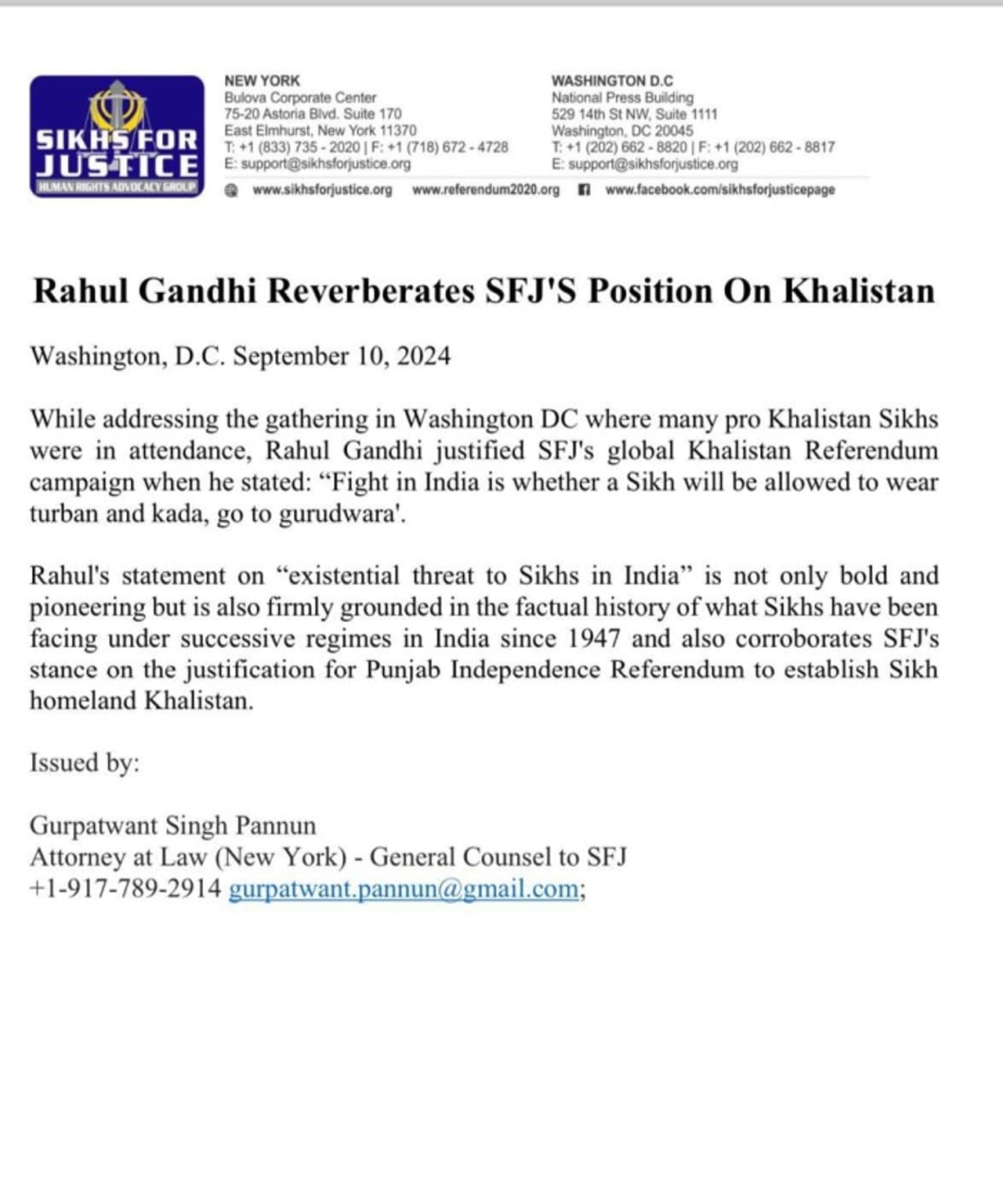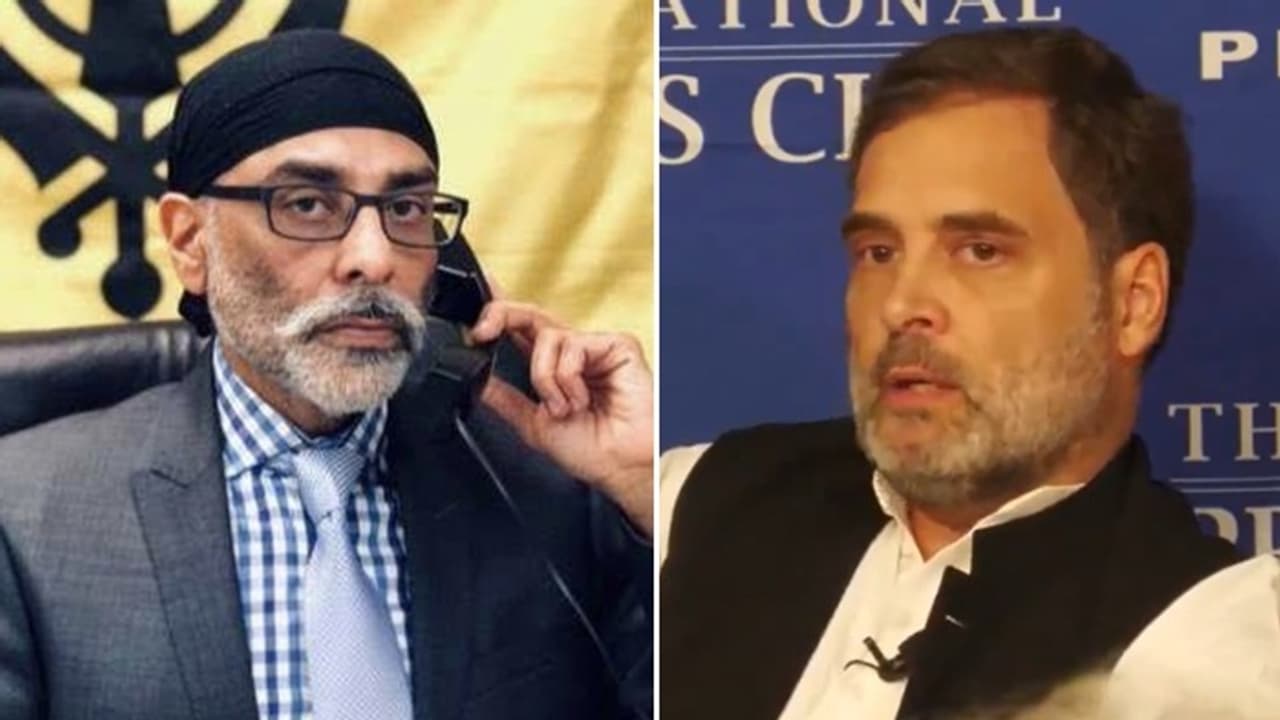Gurpatwant Singh Pannun, the founder of the banned Khalistani terrorist organization Sikhs For Justice (SFJ), has publicly endorsed Congress leader Rahul Gandhi's recent comments made during his visit to the United States.
In a development that has sparked controversy, Gurpatwant Singh Pannun, the founder of the banned Khalistani terrorist organization Sikhs For Justice (SFJ), has publicly endorsed Congress leader Rahul Gandhi's recent comments made during his visit to the United States. This endorsement, made on September 10, 2024, coincides with Gandhi's ongoing trip to Washington D.C., where he has addressed various issues including the status of Sikhs in India.

Gurpatwant Singh Pannun, a US-based Khalistani terrorist with dual citizenship in the US and Canada, issued a statement lauding Rahul Gandhi's remarks about the Sikh community. Pannun described Gandhi's statements as "bold and pioneering," asserting that they align with SFJ’s stance on the need for a Punjab Independence Referendum to establish Khalistan as a Sikh homeland.
In his statement, Pannun praised Gandhi for addressing what he claimed to be the existential threats faced by Sikhs in India. He quoted Gandhi’s remarks from his Washington D.C. address, where the Congress leader purportedly linked the freedom of Sikhs to wear traditional symbols like the turban and kada to a broader struggle for religious freedom and equality.
Pannun stated, “Rahul Gandhi Reverberates SFJ’S Position On Khalistan.” He further claimed that Gandhi's comments provide validation for SFJ’s campaign for Khalistan, highlighting that Gandhi’s views on Sikh issues are “firmly grounded in the factual history” of Sikh experiences under various Indian regimes since 1947.

During his public address on September 9, Gandhi highlighted what he described as a threat to Sikh identity and religious freedom in India. Addressing an audience that included many pro-Khalistan Sikhs, Gandhi questioned whether Sikhs in India would be allowed to maintain their religious practices, such as wearing turbans and kadas, and visiting gurudwaras.
The Congress leader had said, “The fight is about whether he, as a Sikh, is going to be allowed to wear his turban in India or whether he is going to be allowed to wear a Kara in India or whether a Sikh is going to be able to go to the Gurudwara. That’s what the fight is about, and not just for him, for all religions.”
"The fight is also about—I can see here in the crowd—people from Tamil Nadu, Punjab, Haryana; I can see all these people—Telangana, Karnataka, Andhra Pradesh, right? So now see when I say, when I say Kerala, see, I’ve been a member of Parliament for Kerala. So now I say Kerala first, you know, first Maharashtra, Andhra Pradesh, now. So, first, when you say, you don’t understand these things. You say Kerala, it’s just a simple word, or you say Punjab, simple word, you know. But they’re not simple words. These are your history, your language, your traditional imagination is in these words, and what the RSS basically says is that certain states are inferior to other states, certain languages are inferior to other languages, certain religions are inferior to other religions, certain communities inferior to other communities. The fight is about the war of opinion that whether you are from Punjab, Haryana, Rajasthan, Madhya Pradesh—all of you have your history, all of you have your tradition, all of you have your language, and every single one of them is as important as any other one," he continued.
The BJP swiftly condemned Gandhi’s statements. Union Minister Hardeep Singh Puri criticized Gandhi for allegedly promoting a "dangerous narrative" about Sikh issues on foreign soil. Puri defended the Indian government's record on Sikh issues, asserting that Sikhs have never been safer in India than they are now. He emphasized the government's efforts to address Sikh concerns and recalled the 1984 anti-Sikh riots, which he accused the Congress party of mishandling. Puri noted that it took the Modi government’s intervention to reopen cases related to the violence and hold perpetrators accountable.
BJP leader Ravi Shankar Prasad also criticized Gandhi, alleging that his statements reflect a deep-seated prejudice against reservation policies. Prasad suggested that Gandhi's remarks in the US reveal his bias against reservation, contrasting with his public image of supporting constitutional values.
Gurpatwant Singh Pannun is known for his advocacy of Khalistani separatism and has been involved in promoting violence against Indian diplomats and interests abroad. His organization, Sikhs For Justice, is banned under India's Unlawful Activities (Prevention) Act (UAPA) due to its involvement in terrorism and separatist activities. Pannun's recent endorsement of Gandhi’s statements has further complicated the political landscape, highlighting the contentious intersection of diaspora politics and Indian national issues.
